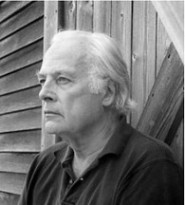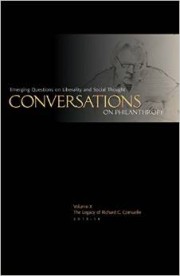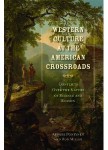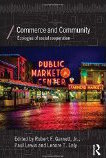Positive Psychology and Philanthropy: Reclaiming the Virtues of Classical Liberalism
In his Afterword to the 1993 edition of Reclaiming the American Dream: The Role of Private Individuals and Voluntary Associations (1993 [1965]), Richard Cornuelle laments that so few libertarians have embraced his vision of a flourishing voluntary community beyond the commercial sphere: “Most of my libertarian friends were willing to discuss possible market solutions to public problems, but, lacking any analytical device but market theory, continued to believe that anything that could not be done profitably should probably not be done at all” (186). Cornuelle’s remark points to an enduring gap in modern liberal thought. Most philosophical liberals celebrate philanthropy—“voluntary giving and association that serves to promote human flourishing” (Ealy, 2005, 2)—as a Tocquevillian alternative to the welfare state, yet their stock in trade conceptions of the free society tend to omit philanthropy, theorizing voluntary cooperation as an exclusively commercial affair.
Nowhere is this gap more evident than in the writings of F. A. Hayek. Hayek lauds voluntary associations for their uniquely effective “recognition of many [philanthropic] needs and discovery of many methods of meeting them which we could never have expected from the government” (1979, 50). He also praises Cornuelle’s Reclaiming the American Dream as an “unduly neglected book” which “seems to me to be one of the most promising developments of political ideas in recent years” (186 and 51). At the same time, Hayek develops his influential theory of the modern liberal order by way of a sustained critique of philanthropic action. Our desire to “do good to known people” is, he argues, an atavistic legacy of our tribal past and “irreconcilable with the open society” (1976, 168). Modernity has spawned a new moral code in which humane ends are better served by commerce than philanthropy, by “withholding from the known needy neighbors what they might require in order to serve the unknown needs of thousands of others” (1978, 268; 1979, 165; see also 1976, 90, 136, 144-45; 1978, 19, 59, 60, 65-66; 1979, 161-62, 168).
While leading scholars in the liberal tradition have begun to turn away from this narrow view of social cooperation in modern commercial societies (Murray 2006; McCloskey 2006; Gregg 2007), our mental maps still tell us that commerce and philanthropy are separate orders that don’t mix well. We continue, therefore, to wrestle with the question posed four decades ago by Cornuelle: How can we theorize a “free and humane” liberal order composed of market processes and “aggressive and imaginative voluntary action in the public interest” (Cornuelle, 1993 [1965], xxxiv ; 1992, 6)? Cornuelle’s goal was, and is, to forge a compelling theory of philanthropic action that would allow thinkers across the ideological spectrum to understand and embrace “the rationality and moral legitimacy of . . . [the] voluntary social process as completely as we now understand and embrace [the] market process” (1993 [1965], 198).
In this essay I seek to advance the Cornuellian project by placing it in dialogue with the emerging literature of positive psychology (Seligman and Csikszentmihalyi 2000; Seligman 2002; Haidt 2006; Keyes and Haidt 2003; Gable and Haidt 2005). The positive psychologists’ conceptions of human nature, freedom, and happiness strike a fresh synthesis of classical (especially Aristotelian) and modern views of the human. Their approach offers a valuable corrective to the Cold War liberalism of Hayek and others whose positions were crafted in strategic opposition to traditions they regarded as precursors to socialism, including much of Aristotle’s ethics, politics, and economics (Hayek 1967 [1947]; 1988). I employ the positive psychologists’ approach here as a means of enriching Cornuelle’s account of philanthropic action in Reclaiming and to envision new lines of classical liberal conversation regarding the nature and significance of philanthropy in contemporary commercial societies.
Read more here.




